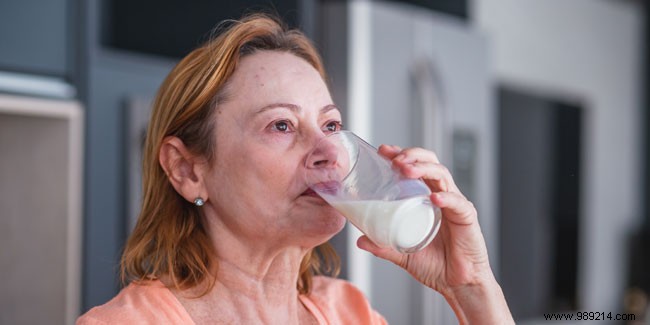
Milk and dairy products are no longer on the rise in France, in particular because of studies published several years ago which pointed to the harmful effects of this type of diet for health. Studies questioned today. Milk and dairy products are indeed essential, particularly for the health of senior citizens, since they are necessary sources of protein and calcium for the elderly and thus allow them to avoid certain diseases specific to aging and malnutrition in particular, a phenomenon that affects many seniors.
As at all ages of life, milk and dairy products in general have benefits in particular on the bone system thanks to their richness in calcium. For seniors, such contributions are even more necessary given the fragility of the bones due to aging.
Milk and dairy products have a positive effect on the health of women after a certain age by preventing them from risking the onset of osteoporosis, which can be described as a progressive decalcification of the bones.
In addition to being essential sources of calcium, milk and dairy products also help provide important nutrients for the health of seniors such as vitamins B6, vitamin B12 and vitamin D, zinc and iodine.
Another benefit of milk and dairy products for seniors:they are an essential source of protein. The latter play a key role in particular on the muscles of the body, but also on the skin, the immune defenses, the blood and its coagulation, digestion, etc.
Protein intake, thanks to milk and dairy products, is all the more important for seniors who, with age, tend to eat less meat, another important source of protein. This protein deficiency in the diet can have major consequences on the health of seniors such as, for example, the occurrence of sarcopenia, a pathology which is characterized by an abnormal loss of muscle mass and which is the main cause of loss autonomy or disability in the elderly.
In general, as indicated by a study by the Center for Nutritional Research and Information (Cerin), "increased calcium and protein intake, by increasing the daily consumption of dairy products, reduces the number of fractures and falls among the elderly".
Drinking milk, eating cheese and yogurt in a certain proportion (3.5 daily portions) help seniors to reduce the risk of fractures by 33%, and in particular by 46% with regard to hip fractures, and an 11% reduction in the risk of falls.
As with all healthy foods, milk and dairy products are the subject of nutritional recommendations published by the High Council for Public Health (HCSP) as part of the National Health Nutrition Program.
The organization is particularly interested in the diet of the elderly, which plays a key role for this population more affected by health problems that increase with age, especially after 75, such as muscle weakness, fatigue , slow walking, physical inactivity, involuntary weight loss and malnutrition.
From a nutritional point of view, the HCSP emphasizes that for seniors "the body composition changes with advancing age, with a gradual increase in fat mass and a loss of muscle and bone mass, then a gradual decrease in fat and lean masses after 75-80 years". On the other hand, certain diseases to which the elderly are more prone have consequences on their diet, in particular the reduction in calcium and protein intake necessary for good health.
Hence the importance of eating well and in particular of consuming milk and dairy products for seniors according to specific recommendations. Thus, it is recommended that people aged 55 and over increase their consumption of dairy products and go from 3 to 4 dairy products per day (before this age, these proportions are 2 per day). The proportions of dairy products to consume daily and recommended by the HCSP are 150 ml of milk, 125 g of yogurt and 30 g of cheese, avoiding fatty and salty cheeses.
Milk and dairy products can thus be consumed for dessert or breakfast, at the end of a meal by having a slice of cheese or by using grated cheese to prepare different dishes (gratins, cheese pies, etc.) . Organic raw milk is to be preferred since it retains all its nutritional and organoleptic qualities, but it is sometimes difficult to obtain it; in this case, opt for whole milk rather than semi-skimmed or skimmed, preferably pasteurized, and as a last resort U.H.T.
Be careful, products such as fresh cream or butter should be consumed with more moderation because they are not dairy products but fat, and they are not very rich in calcium. The same goes for chocolate bars and industrial dairy desserts (dessert creams, flans, etc.) which actually contain little milk and are very sweet.